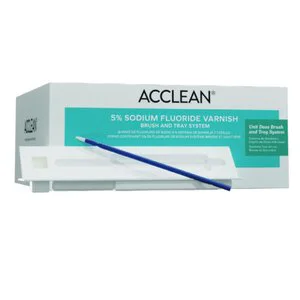Filter Products
Filter Products
Fluoride Products
As low as
$116.09As low as
$14.20As low as
$146.10As low as
$11.28As low as
$53.68As low as
$123.99As low as
$251.75As low as
$206.72As low as
$22.88As low as
$295.25What fluoride products are commonly used in dentistry?
Dental fluoride products are commonly used to prevent tooth decay and promote oral health. They contain fluoride, a mineral that strengthens tooth enamel and helps prevent cavities. There are various types of fluoride products available, including:
- Fluoride Foam: A highly concentrated fluoride product that is applied directly to the teeth. It is typically used in professional dental settings, such as during dental cleanings or treatments. The foam is dispensed from a canister and is usually left on the teeth for a short period before being rinsed off. The frequency of use will depend on the dentist's recommendations and the specific dental needs of the patient.
- Fluoride Gels: Another common form of topical fluoride treatment. They are typically applied to the teeth using a mouth tray or a brush. The gel is left on the teeth for a specified time to allow for maximum fluoride absorption. Fluoride gels are commonly used in dental offices, but some products may be available for at-home use. Individuals should consult with their dentists to determine if using fluoride gel at home is appropriate for their oral health needs.
- Fluoride Rinses: Liquid solutions that contain fluoride. They are swished around the mouth for a specified time, allowing the fluoride to come into contact with the teeth and gums. Fluoride rinses are often used as a supplement to regular brushing and flossing.
- Fluoride Varnishes: A popular option for fluoride treatment. They are painted onto the teeth using a brush or applicator. The varnish adheres to the tooth surface and gradually releases fluoride over time, providing long-lasting protection against tooth decay.
How can dental professionals incorporate fluoride treatments into their practice to improve patient outcomes and satisfaction?
Dental professionals can incorporate fluoride treatments into their practice to improve patient outcomes and satisfaction by implementing a comprehensive approach. They can educate patients about the benefits of fluoride and its role in preventing tooth decay.
Dental professionals can assess each patient's specific oral health needs and recommend the appropriate type and frequency of fluoride treatment, such as fluoride gels, rinses, varnishes, or professional applications. They can also provide instructions on proper at-home fluoride use and oral hygiene practices. Regular monitoring and follow-up appointments allow dental professionals to track the effectiveness of fluoride treatments and make any necessary adjustments.
By incorporating fluoride treatments into their practice and offering personalized care, dental professionals can enhance patient outcomes, reduce the risk of dental problems, and improve overall satisfaction.
























